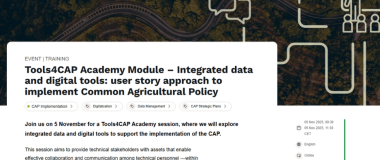
05/11/2025
EU CAP Network
Tools4CAP Academy: Data Integration and Use of Digital Tools in CAP Implementation
A new Tools4CAP Academy module dedicated to data integration and the use of digital tools in CAP implementation will be held online on 5 November 2025 . Standardized models, the legal framework of the






